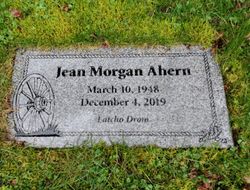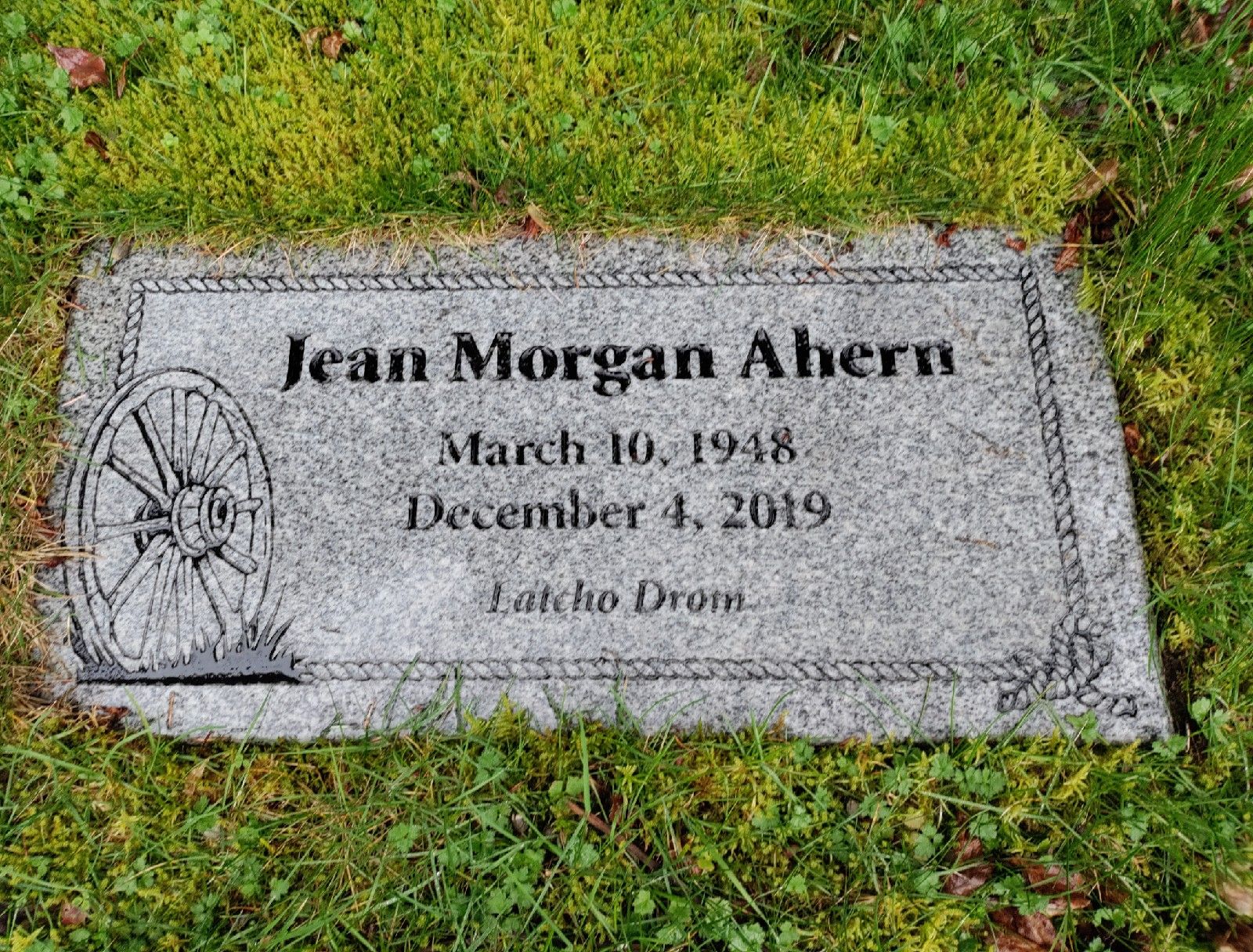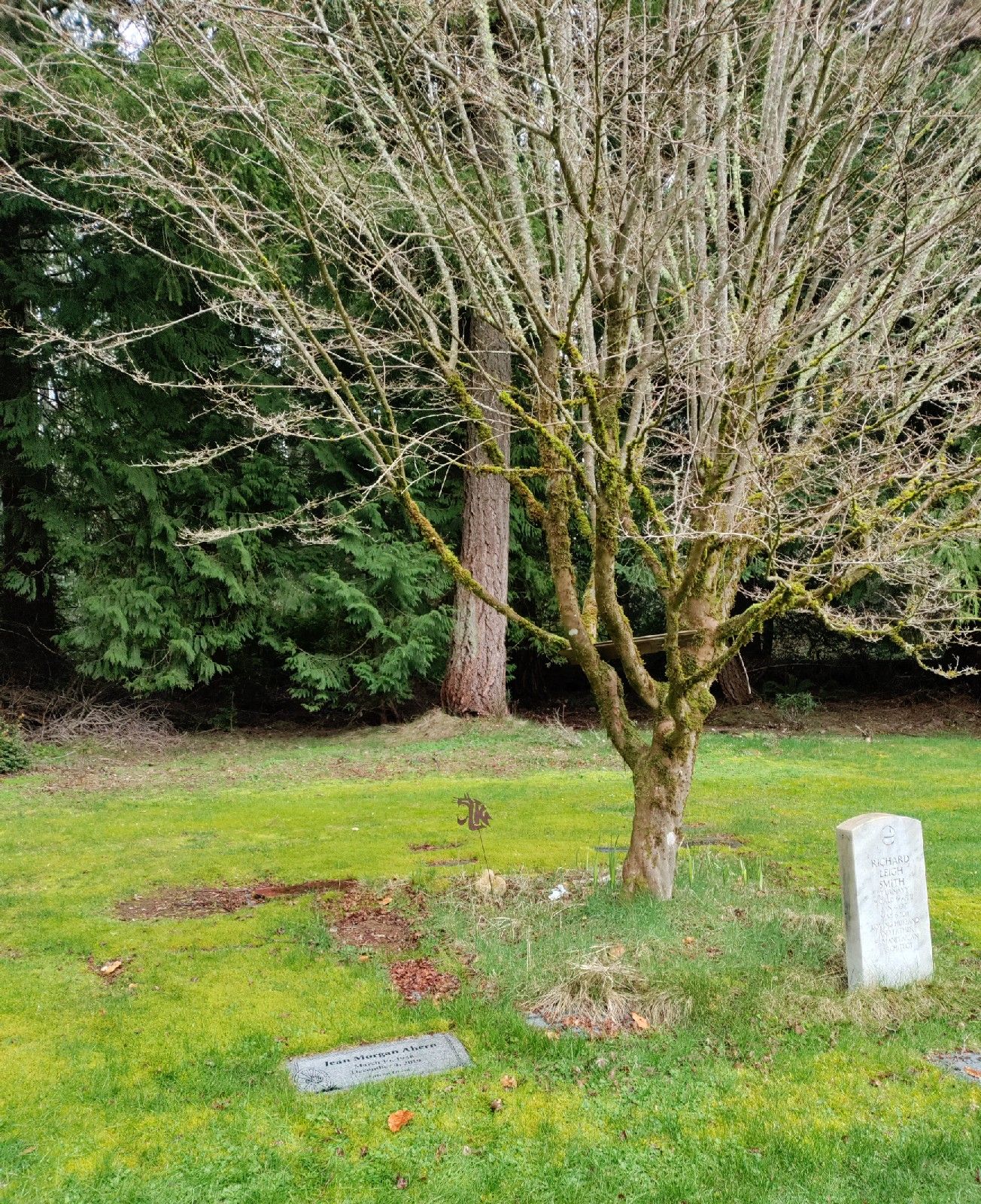Morgan Ahern, Romani name Punkajia Jiavonni Morgan Luczako Zyrelic Fucharelle Heron, born on March 10, 1948, in Brooklyn NY, died of lung cancer on December 4, 2019, on Vashon Island, WA. Her father, Cornelius Ahern, was Romanichal, from Ireland, her mother, Rosemary Ahern, was Sinti, from Italy. Her mother’s family fled Italy shortly before WWII, those of her family who were not able to leave were killed in Auschwitz. Her father’s family had been in the U.S. for many generations.
At the age of seven, Morgan was taken from her birth family and put into foster care, as was common with Romani (Gypsy) children at the time. Morgan lost her birth language and had her hair cut, the style of her clothes changed, and her name changed to Jean. She was bounced around to different foster homes and orphanages, and eventually ended up at Queen of the Rosary Academy in Amityville, NY, as a teen. There she became girlfriends with another girl (Sue), and because of their lesbian relationship, they were sent to Pilgrim State Children’s Mental Hospital, where they were given electroshock treatment for their lesbianism. Sue ended up committing suicide, and Morgan got out of the hospital by pretending to become “normal” – wearing a dress, shaving her legs, putting on makeup. After being discharged from the hospital, with no way to find her birth family, and nowhere to go, she ended up on the streets. She also did a period of time in the Women’s House of Detention in Manhattan, where a brief encounter with Angela Davis, also locked up there, changed her life. That, and that she was offered a place to stay by a woman who befriended her – Jill Johnston. She became involved in the women’s and gay rights and anti-Vietnam war movements at this time.
Morgan saw a sign at a methadone clinic offering young women free tuition and room and board to go to Notre Dame of Staten Island College. She went there for two years, and then to Richmond College (also free tuition), part of the City University of NY, where she earned a women’s studies degree. She received her M.A. in sociology and history from Goddard Cambridge, Cambridge, MA. As one of the first women to receive a women’s studies degree, she was recruited by the University of Colorado in Boulder to help set up a women’s study program there. She then moved to Denver, where she reunited with her mother, running into her on a downtown street – her mother had moved to Denver to live near Morgan’s brother and his family. Morgan’s sister ended up in Denver as well.
In Denver, Morgan worked various jobs to pay the rent, while working in and helping to organize various political groups. She worked in one of the women’s bookstores, helped out at Big Mama Rag, a feminist newspaper, and was an organizer of the Women’s Psychiatric Inmates Liberation Front, which protested the use of electroshock therapy and of forced drugging of psychiatric inmates.
Morgan moved to Seattle in 1985, where she immediately became involved in political activism there – solidarity with liberation movements in Central America, Palestinian rights, fighting the right-wing emboldened by Reaganomics, fighting racism and anti-Semitism, working for women’s and gay rights, against police brutality. She got a job as a note-taker for Deaf students at Seattle Central Community College, where she enjoyed interacting with the Deaf community and with the other students and teachers. She became a sought after speaker around Romani culture and politics, about anarchism and fascism, about gay issues, about Madness, about the Holocaust, speaking at Seattle’s community colleges, the University of Washington, King County Libraries, the Washington State Holocaust Education and Resource Center and more. She started Red Bandana, an educational and political organization formed to draw attention to racism against the Romani people. She created a blog and Facebook page, both called Lolo Diklo: Romani Against Racism: dedicated to raising awareness about the history, culture and true lives of Romani people worldwide. She helped organize many protests, demonstrations, marches, concerts and cultural events.
Morgan Ahern, Romani name Punkajia Jiavonni Morgan Luczako Zyrelic Fucharelle Heron, born on March 10, 1948, in Brooklyn NY, died of lung cancer on December 4, 2019, on Vashon Island, WA. Her father, Cornelius Ahern, was Romanichal, from Ireland, her mother, Rosemary Ahern, was Sinti, from Italy. Her mother’s family fled Italy shortly before WWII, those of her family who were not able to leave were killed in Auschwitz. Her father’s family had been in the U.S. for many generations.
At the age of seven, Morgan was taken from her birth family and put into foster care, as was common with Romani (Gypsy) children at the time. Morgan lost her birth language and had her hair cut, the style of her clothes changed, and her name changed to Jean. She was bounced around to different foster homes and orphanages, and eventually ended up at Queen of the Rosary Academy in Amityville, NY, as a teen. There she became girlfriends with another girl (Sue), and because of their lesbian relationship, they were sent to Pilgrim State Children’s Mental Hospital, where they were given electroshock treatment for their lesbianism. Sue ended up committing suicide, and Morgan got out of the hospital by pretending to become “normal” – wearing a dress, shaving her legs, putting on makeup. After being discharged from the hospital, with no way to find her birth family, and nowhere to go, she ended up on the streets. She also did a period of time in the Women’s House of Detention in Manhattan, where a brief encounter with Angela Davis, also locked up there, changed her life. That, and that she was offered a place to stay by a woman who befriended her – Jill Johnston. She became involved in the women’s and gay rights and anti-Vietnam war movements at this time.
Morgan saw a sign at a methadone clinic offering young women free tuition and room and board to go to Notre Dame of Staten Island College. She went there for two years, and then to Richmond College (also free tuition), part of the City University of NY, where she earned a women’s studies degree. She received her M.A. in sociology and history from Goddard Cambridge, Cambridge, MA. As one of the first women to receive a women’s studies degree, she was recruited by the University of Colorado in Boulder to help set up a women’s study program there. She then moved to Denver, where she reunited with her mother, running into her on a downtown street – her mother had moved to Denver to live near Morgan’s brother and his family. Morgan’s sister ended up in Denver as well.
In Denver, Morgan worked various jobs to pay the rent, while working in and helping to organize various political groups. She worked in one of the women’s bookstores, helped out at Big Mama Rag, a feminist newspaper, and was an organizer of the Women’s Psychiatric Inmates Liberation Front, which protested the use of electroshock therapy and of forced drugging of psychiatric inmates.
Morgan moved to Seattle in 1985, where she immediately became involved in political activism there – solidarity with liberation movements in Central America, Palestinian rights, fighting the right-wing emboldened by Reaganomics, fighting racism and anti-Semitism, working for women’s and gay rights, against police brutality. She got a job as a note-taker for Deaf students at Seattle Central Community College, where she enjoyed interacting with the Deaf community and with the other students and teachers. She became a sought after speaker around Romani culture and politics, about anarchism and fascism, about gay issues, about Madness, about the Holocaust, speaking at Seattle’s community colleges, the University of Washington, King County Libraries, the Washington State Holocaust Education and Resource Center and more. She started Red Bandana, an educational and political organization formed to draw attention to racism against the Romani people. She created a blog and Facebook page, both called Lolo Diklo: Romani Against Racism: dedicated to raising awareness about the history, culture and true lives of Romani people worldwide. She helped organize many protests, demonstrations, marches, concerts and cultural events.
Inscription
Latcho Drom
(means "safe journey" and is a 1993 French film directed and written by Tony Gatlif. The movie is about the Romani people's journey from north-west India to Spain, consisting primarily of music).
Family Members
Sponsored by Ancestry
Advertisement
Explore more
Sponsored by Ancestry
Advertisement





